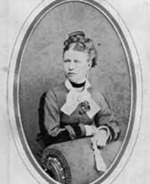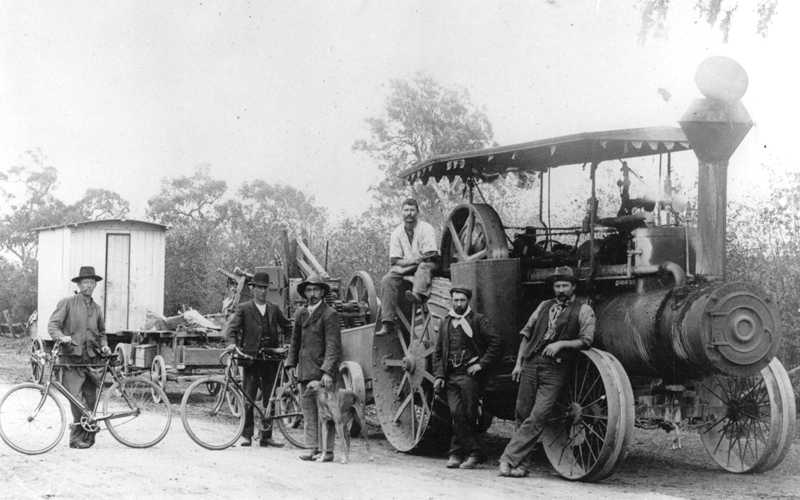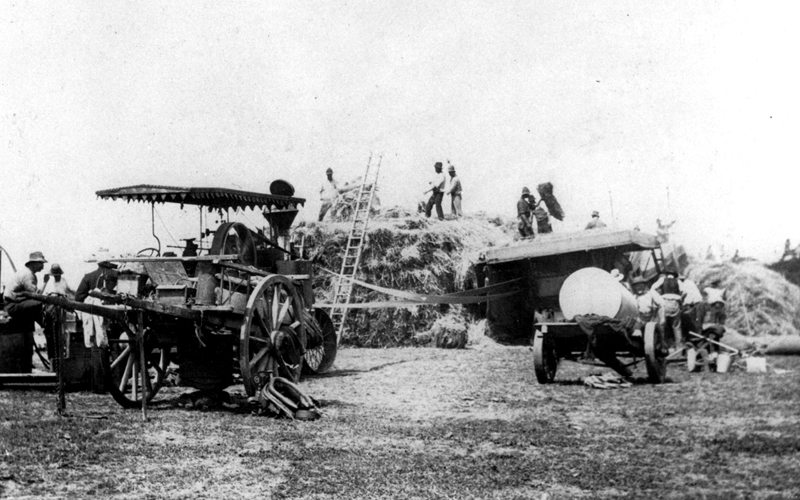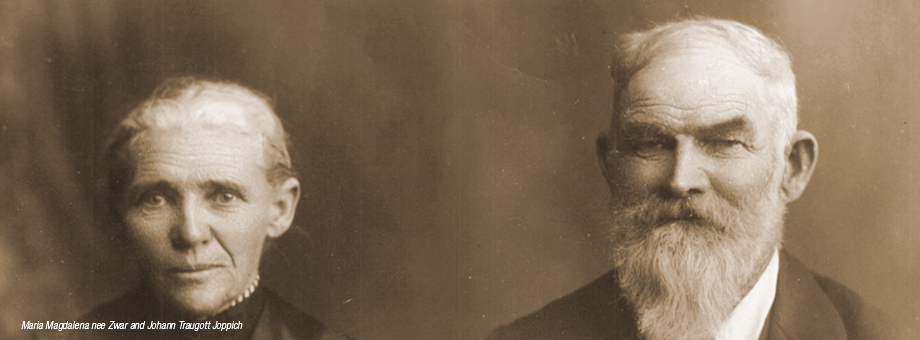
Emily Marchbank nèe Zwar (E3)
- Born: 4th July 1857
- Parents:
Michael and Agnes Zwar, nee Zimmer - Thomas Marchbank
- Lived:
Victoria, Australia - Died: 26th September 1951
- Buried:
- Married:
Detailed biography
First Child born at Broadford
Emily Zwar was the first of Michael and Agnes Zwar’s children to be born at Broadford. She was the third child and arrived on 4th July 1857. [Emily didn’t have a second name – Gavan Crowl]. [Any Baptism record?]
By the time Emily began school there were three more children in the family. When she finished school there were nine children in the family and Emily and her older sister Anna were kept busy helping their mother with the housework. [Any record of her schooling?]
Sister Anna and Babies
When Emily was 17 years old her elder sister Anna married George Bidstrup. This left Emily to help her mother with her six brothers and two little sisters, and three years later their last sister Ada arrived.
Meanwhile Anna and George Bidstrup were producing babies, and each time it was Emily who went and cared for her sister and family before and after the happy event. The only one not so appreciative of these happy occasions was Thomas Marchbank. Thomas had been courting Emily for some time and after she had been away the fourth time to help Anna bring a little Bidstrup into the world – and they put off their own marriage twice -Thomas complained to Emily’s father Michael. Thomas threatened to go and look for a wife elsewhere unless Emily stopped postponing the marriage to go and help her sister bring another Bidstrup into the world.
Marriage
Later the same year Emily Zwar and Thomas Marchbank were married, on 8th November 1882 in St. Matthews, Broadford, by Rev Andrew Toomath. Thomas was 36 years old, and Emily 25. Thomas worked together with his brother James and their father John William Marchbank
“as Saw Mill owners, Agricultural Implement proprietors, and Farmers and cattle Dealers at Broadford and elsewhere…”
Two years after Thomas married Emily, the Marchbank business partnership was dissolved on 17th June 1884, on Thomas paying to James Marchbank:
“the sum of Fifty pounds in money and also hand over and deliver to him a certain Engine by Ronsome and Sims number 1163 a Saw-Bench and gear six circular saws Tip Dray and Bay Mare branded B on the near shoulder and harness and also transfer to him the said James Marchbank crown allotment 16 section 22 Town and Parish of Broadford.”
From the ‘Deed of Dissolution’
Wattle Grove and Threshing Machine

Steam Traction Engine, originally Marchbank, and then Zimmer

Threshing the wheat
Their father dropped out of the partnership, James received the town block of land and the saw mill, and Thomas took over the threshing machine and Steam Engine, and received the dairy farm called “Wattle Grove” about three kilometers east of Broadford.
At Wattle Grove Emily looked after the cows. Thomas was not so keen on dairying and traveled the District with his Threshing Machine to thresh wheat for the farmers. The threshing machine was driven by a huge and (by our modern standards) cumbersome steam traction engine.
The threshing operation employed about a dozen men, who included some of the Zimmer lads from Thomastown, Emily’s cousins (on her mother’s side). Many years later the Zimmers bought the threshing machine and steam engine and became well-known in the farming areas northeast of Melbourne as they travelled from farm to farm threshing the wheat.
When the farmers had stripped the heads from their ripened wheat crops Thomas Marchbank would travel from farm to farm for the threshing. The heads of wheat were threshed by the machine so that the grains would fall out one side to be bagged, and the chaff and straw from another outlet. The straw was compressed as hay feed for cattle and sheep.
Visitors
Scarcely a day passed at Wattle Grove without visitors calling and staying for a meal. Sometimes they stayed for the night. One or two of the five Zimmer lads would often turn up from Thomastown and stay for a night or two.
Sister Ada
When Emily’s mother died in 1891 Emily’s youngest sister Ada was only 14 years old, so she came and lived with Emily and Thomas at Wattle Grove. A workman was employed to help on the farm, and for a time ‘young Tom’, a nephew of Thomas, worked and lived there.
Sister Agnes
When Emily’s brother Charles married and took over the Zwar property, their sister Agnes went to Melbourne to study for a nursing career. When Agnes was not in Melbourne she would also stay at Wattle Grove with the Marchbanks and her sister Ada.
Social Visits
Thomas and Emily had no children. Emily would go to Melbourne for a few days, or she would go to Beechworth for a fortnight to visit her brothers who were in the tannery trade there. When she returned she would have news for the Broadford families and this would take up a number of social visits for a further number of days. One of these visits would be to the Bidstrups to visit her sister Anna, and she would usually bring home a turkey.
Life at Home
At home Emily did the cooking, and Ada the sewing. Sometimes it would be Ada who would be away all day visiting. On one such occasion when she arrived home late at night, as is noted in her diary:
“Em and Tom waiting for me at the gates, anxious as per usual”.
Some evenings were spent with friends or relatives playing cards or making music.
Fishing
Thomas and Emily loved to go down to the creek fishing. Sometimes they caught two or three dozen fish. Ada records in her diary the day Tom caught a one and a third pound cod and she
“thought he landed a whale great was the noise thereof”.
Thomas and Emily attended services in the Anglican Church on Sundays, either in the morning or evening, and sometimes both times.
Help for Thomas
Thomas suffered from diabetes and with increasing age he had difficulty working. In 1906 Ada went to South Africa and married Samual Crowl, a miner. Emily wrote to the the Crowl’s and invited them to come and live at Wattle Grove where they could help with the farm. They arrived the following year.
Deaths
In 1908 Thomas Marchbank died. He was 64 years old. He and Emily had been married 26 years.
Two years later Samual Crowl died, leaving Ada a widow with two small boys.
Sister Agnes
Within a few years Agnes Zwar had to give up her nursing career. She suffered from severe bilious or migraine attacks and she went to live at Wattle Grove too. Now three Zwar sisters, Emily Marchbank, Agnes Zwar and Ada Crowl lived on the farm and cared for Ada’s two sons Lyall and Gavan.
Defined Roles at Wattle Grove
Gavan recalled that the three women each had a clearly defined role. His mother Ada did the housework and cooking. Agnes cared for the flower garden and the fowls. Emily attended to the milking and the vegetable garden.
A typical day for Emily meant that she was up by 6 a.m. for a cup of tea for herself and some tidbits for Darkie the dog. Then the two would set out to bring the cows in from the home paddock. Chaff and bran would go into the bails and Emily would settle down to milk the cows. After milking the fowls would be let out, the milk separated and the cows taken across the railway line to a paddock leased from Kenny’s. Emily would then separate the milk, feed the calves with milk and the pigs with skimmed milk. The cream was cooled ready for making butter or to take to the butter factory in Broadford. Breakfast about 8.30, and then some work in the vegetable garden.
Two days a week Emily would catch and harness the pony to the jinker or buggy and take eggs, butter and cream in to Broadford, and she would likely drop off some vegetables from her garden to her married brothers.
Afternoon Rest and Milking
After the midday meal there was the afternoon rest and afternoon tea about 4 p.m. Darkie would get his share and then go for the cows down the road and across the railway line to ‘Kenny’s’. After the milking, separating the milk from the cream, feeding milk to the calves and the pigs, and then the cows would be put in the home paddock for the night, and in winter would be fed some sheaves of hay.
More Fishing
If there was still enough light after the evening meal there would be an evening’s fishing.
On a special day everyone would set off after breakfast for a fishing trip. The horse would be put in the buggy, the three sisters climbed up on the seat and the two boys sat at the rear end with their feet dangling out the back. They would go half way to Tallarook for a day’s fishing in the Sunday Creek. There was never any problem getting worms. Each milking session ended with cleaning and washing the brick walls of the bails. Cow manure went into a half tank in a shaded corner. A little soil was added and this became home for a seething mass of worms. Fishing was Emily’s delight. One day Emily and two companions caught over 300 blackfish.
Rabbiting
On other occasions they would add rifles and mattocks to the buggy and head toward the ranges hunting rabbits. They would usually catch about 20 before heading home in time for the evening milking.
Emily
Emily was always patient and understanding by nature. More so than her sisters! She was also quick witted and particularly good at repartee. Their brother William would occasionally turn up from King Island for an unexpected stay. Emily was always quite patient and understanding even when Billy’s stay was longer than normal.
Struggles in the Depression Years
As the tree sisters grew older they faced quite a struggle, particularly when the Depression years came and made life difficult for everyone in the District. In his unobtrusive manner their brother Albert saw to it that they were not financially embarrassed. Arnold, their nephew, arranged to lease Wattle Grove to run some sheep. In their earlier years a succession of farm laborers was employed at £1 per week plus board and keep. Two of the best were Bill Smith and Jim Gordon.
Church.
The three sisters continued to be involved in their church’s life as long as they were active.
Agnes died in 1948. Emily Marchbank died in the Broadford Bush nursing hospital on 26th September 1951 aged 94 years. She had been a widow for 43 years. She left Wattle Grove to her nephews Lyall and Gavan Crowl. Later Gavan lived on the property with his wife Betty.
The Freeway
The Wattle Grove farm was made up of three sections, numbers 51, 52 and 53, approximately 90 acres each, and originally a total of about 266 acres. Over the years it has been reduced with land taken for the railway, the highway, and finally the Freeway that bypasses Broadford. Today the traffic speeds by at over 100 kilometers an hour along the Freeway and the days of the horse and jinker have been left behind. If one could put the Marchbank home back it would sit metres above the cars speeding along the Freeway from Melbourne to Sydney.
© Kevin Zwar
